may 15, 1911 - William Taft invokes the Sherman Anti-Trust Act (1911)
Description:
In 1911, President William Howard Taft took a bold crackdown on Standard Oil by invoking the Sherman Antitrust Act on the company. He did this because Standard Oil was a monopoly that used their market power to stifle the growth of other businesses through practices like predatory pricing, where Standard Oil would temporarily lower prices to drive smaller competitors out of business only to make them skyrocket again. This angered small businesses and the public. The Taft administration's lawsuit resulted in a Supreme Court ruling that Standard Oil must be broken into smaller companies to prevent it from continuing as a monopoly. Taft's actions were celebrated by the public, but workers in the newly-created smaller companies continued to endure grueling hours with low pay and horrible working conditions.CONNECTIONS TO LIBERALISM:
Taft's actions in breaking up Standard Oil represent a rejection of classical liberalism's principle of economic freedom in favor of modern liberalism, which emphasizes the role of government in creating a fairer market.
Classical liberalism holds that government interference is a detriment to the market, supporting that businesses should have the economic freedom to serve consumers and gain an edge over competitors in order to be successful. In a classical liberalist view, monopolies like Standard Oil are seen as an example of this success. However, Taft opposed the idea of unrestricted economic freedom, adopting a modern liberalist perspective. Modern liberalism believes that government intervention is crucial to ensure all participants in the market receive equal opportunities. By using the Sherman Antitrust Act to dismantle Standard Oil, Taft supported modern liberalist thought because he used government power to ensure that no single corporation could stifle competition and dominate the market at the expense of smaller oil businesses and consumer choice.
Added to timeline:
Date:
may 15, 1911
Now
~ 114 years ago
